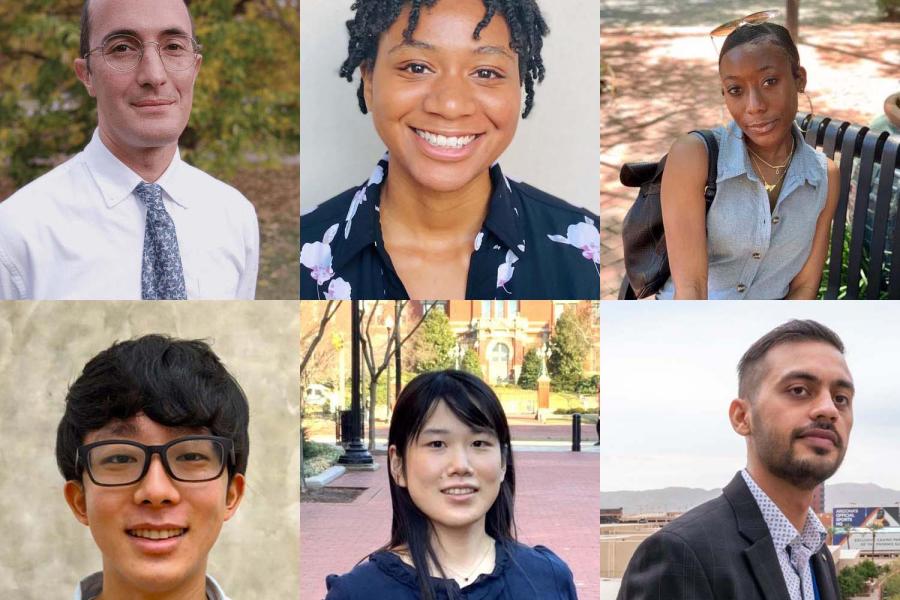Five current Johns Hopkins PhD students and an undergraduate alumna were recently named to the inaugural class of Quad Fellows—100 students hailing from Australia, India, Japan, or the United States who show exceptional promise in STEM fields.
Supported by philanthropy venture Schmidt Futures, the Quad Fellowship is an initiative of the partner countries, who sponsor the opportunity with support from corporate donors. Twenty-five fellows are selected from each country, and fellows receive funding, mentorship, and opportunities for cohort-wide trips and cross-cultural exchange.
Members of the cohort from Johns Hopkins are:
Leon Di Stefano—Australia
Currently pursuing a PhD in biostatistics at Johns Hopkins, Di Stefano is a statistician working on problems in genomics and precision medicine. He holds a Bachelor of Arts degree and a Master of Sciences degree, both from the University of Melbourne. Following his studies in Melbourne, he worked in computational biology at the Walter and Eliza Hall Institute in Parkville, Australia. He has worked on pooling data from COVID-19 clinical trials and is developing statistical methods to help understand a class of rare genetic diseases. Di Stefano is passionate about statistical techniques that are transparent and interpretable, and communicating compelling statistical ideas clearly. Originally from Australia, he now lives in Baltimore with his wife and three children.
Maya Foster—United States
A member of the Johns Hopkins University class of 2020, Foster is currently a PhD student in biomedical engineering at Yale University, where she is developing computational methods to understand severe mental illness. During her time at Hopkins, she founded Voices of Color, a networking opportunity to connect Hopkins community members who identify as women of color, and Culture Festival, an annual event where student groups at Hopkins share their culture through performances, activities, food, and more. Following graduation, she was named a Luce Scholar. Foster works tirelessly to develop innovative computational methods that unearth actionable insights from brain imaging data—data that are predictive about the developmental course of psychotic symptoms. Foster enjoys spending time with friends, traveling the world, organizing initiatives that bring together diverse groups of people, and advocating for positive change.
Sharun Kuhar—India
Inspired by applied fluid mechanics research in medicine, Kuhar is pursuing a PhD in modeling gastrointestinal biomechanics at Johns Hopkins' Whiting School of Engineering. Prior to coming to Hopkins, he graduated from the Indian Institute of Technology, Kanpur, with a B.Tech-M.Tech dual degree. Kuhar recently published papers on how the dissolution of oral tablets inside the stomach is affected by posture, and how the digestion inside the stomach is affected by gastric disorders. He loves reading fantasy and science fiction and learning new guitar licks, and he is always up for going on a run or playing chess. In the future, he wants to continue working on interdisciplinary research problems in the field of medicine.
Yotaro Sueoka—Japan
Enthralled by the intricacy of cognitive behavior, Sueoka is pursuing a PhD at the Johns Hopkins School of Medicine, where he combines electrophysiology and virtual reality to understand how the hippocampus forms episodic memory and directs spatial navigation. Before coming to Hopkins, he completed a Bachelor of Science degree in biological engineering and brain and cognitive sciences at the Massachusetts Institute of Technology, where he investigated the mechanism of language comprehension in the brain. Alongside his own academic endeavors, Sueoka also serves as a director for XPLANE, a nonprofit that aids students who, like Sueoka, hope to pursue graduate studies outside of Japan.
Saki Takayanagi—Japan
A cell biologist passionate about basic biomedical research, Takayanagi is currently pursuing a PhD at the Johns Hopkins School of Medicine. Prior to coming to Hopkins, she earned Bachelor of Arts and Master of Sciences degrees from the University of Tokyo, where she studied pharmaceutical sciences and revealed how cells adapt to internal and external environmental stressors, such as local inflammation and cold temperatures. By integrating techniques and concepts in molecular and synthetic biology, she aspires to develop one-of-a-kind molecular tools to shed light on the ways abnormal biomolecular assemblies damage nerve cells. Ultimately, she aims to gain novel therapeutic insights into incurable neurodegenerative disorders.
Parris Washington—United States
A National Science Foundation Graduation Research Fellowship recipient and a P.E.O. scholar, Washington is pursuing a PhD in human genetics at the Johns Hopkins School of Medicine, where she studies neural development and sleep. A 2021 Science for Social Equity Fellow and a Washington, D.C., native, she graduated from Spelman College in 2017 and earned a master's degree in neuroscience the following year at the Morehouse School of Medicine, where she conducted research in the field of biological rhythms and sleep. At Hopkins, she has served as student representative on the Johns Hopkins Medical School MA-PhD Committee, the faculty and student committee that develops policy for graduate programs under the medical school umbrella. Washington's professional goal—rooted in the belief that science is more than a field of study but is essential to the well-being of the common individual—is to bring science education and policy to local communities, envisioning curriculums that translate community concerns into actionable science and health policy.
Posted in University News, Student Life
Tagged fellowships, student life








